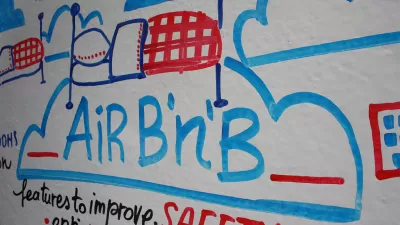The San Francisco Chronicle published a sweeping portrait of Airbnb's operations within the city of San Francisco—from previously unreleased data to personal stories of renters.
The bulk of the article details the findings of a first-of-its-kind data analysis of Airbnb operations, which is typically protective of data that tells the story of how and when its services are uses. "Although the company refuses to release numbers, a data analysis commissioned by The Chronicle found almost 5,000 San Francisco homes, apartments, and private or shared rooms for rent via Airbnb. Two-thirds were entire houses or apartments, showing how far Airbnb has come from its couch-surfer origins, and contradicting its portrayal as a service for people who rent out a spare room and interact with guests," according to the Chronicle's coverage.
Connotate Inc., a Web data harvesting firm, compiled the data from Airbnb’s website. Findings break down the total number of units are rented, what kinds of houses or apartments are rented, and how much they cost, among other metrics.
Gabriel Metcalf, executive director of SPUR, is quoted in the article, providing his take on the findings: "From a policy perspective, the real issue is whether there are a lot of units that have been removed from the housing market because of short-term rentals…It looks like that’s not a big number yet, but that’s what we need regulation to control so it doesn’t become big."
The Chronicle's broad coverage includes maps of the number of neighborhood rentals and average daily prices, as well as a suite of stories that dig deeper into the experience Airbnb.
FULL STORY: Window into Airbnb’s hidden impact on S.F.

Planetizen Federal Action Tracker
A weekly monitor of how Trump’s orders and actions are impacting planners and planning in America.

Map: Where Senate Republicans Want to Sell Your Public Lands
For public land advocates, the Senate Republicans’ proposal to sell millions of acres of public land in the West is “the biggest fight of their careers.”

Restaurant Patios Were a Pandemic Win — Why Were They so Hard to Keep?
Social distancing requirements and changes in travel patterns prompted cities to pilot new uses for street and sidewalk space. Then it got complicated.

Platform Pilsner: Vancouver Transit Agency Releases... a Beer?
TransLink will receive a portion of every sale of the four-pack.

Toronto Weighs Cheaper Transit, Parking Hikes for Major Events
Special event rates would take effect during large festivals, sports games and concerts to ‘discourage driving, manage congestion and free up space for transit.”

Berlin to Consider Car-Free Zone Larger Than Manhattan
The area bound by the 22-mile Ringbahn would still allow 12 uses of a private automobile per year per person, and several other exemptions.
Urban Design for Planners 1: Software Tools
This six-course series explores essential urban design concepts using open source software and equips planners with the tools they need to participate fully in the urban design process.
Planning for Universal Design
Learn the tools for implementing Universal Design in planning regulations.
Heyer Gruel & Associates PA
JM Goldson LLC
Custer County Colorado
City of Camden Redevelopment Agency
City of Astoria
Transportation Research & Education Center (TREC) at Portland State University
Camden Redevelopment Agency
City of Claremont
Municipality of Princeton (NJ)



























